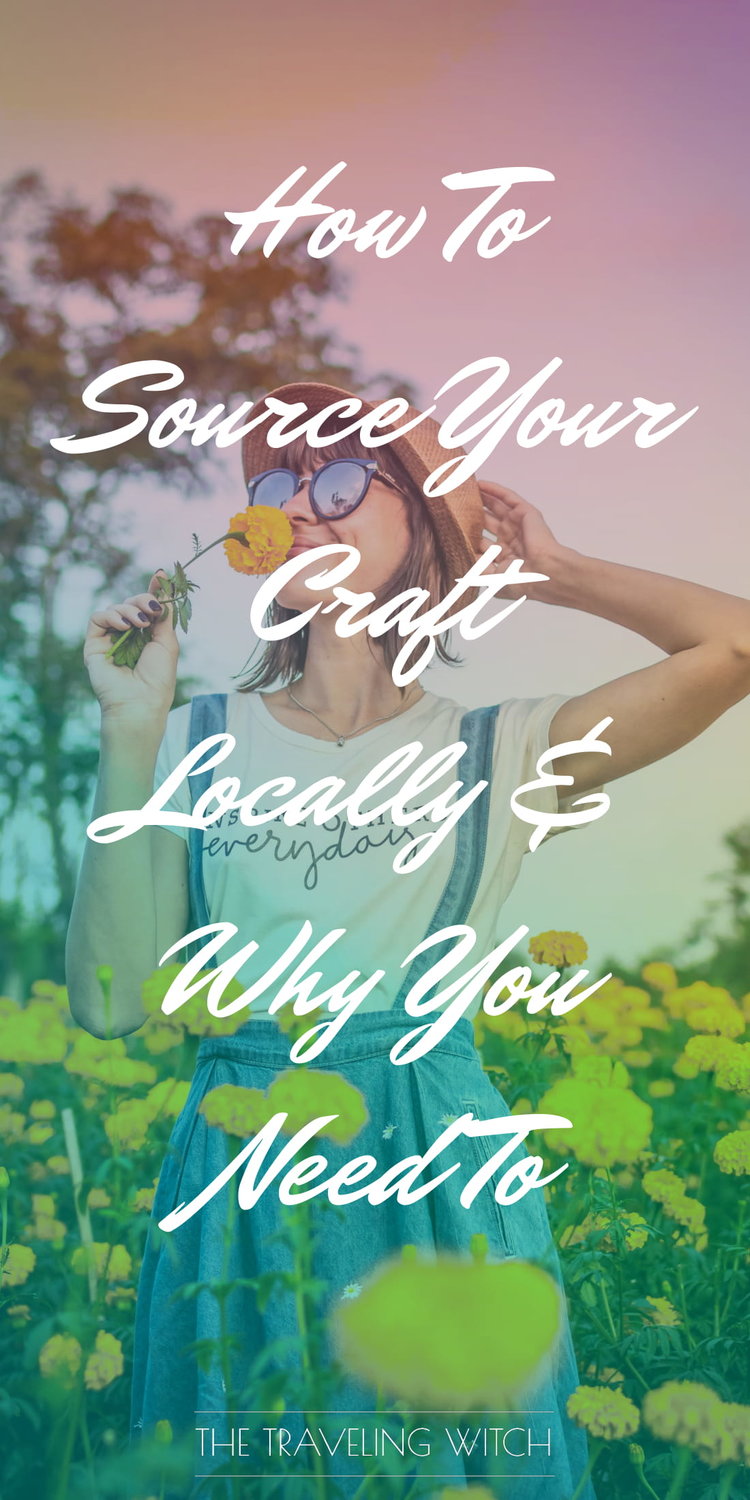“Buy local!” is a refrain you’ll hear from many groups of people, most of them touting some environmental benefit of living more locally. While this is a fine endeavor, it’s not what we’re going to talk about today. No, as a group witches rarely need to be lectured on the merits of going green, we tend to be an environmentally conscious bunch as it is. Instead, what we’re going to be talking about are the mental and magical benefits to sourcing your ingredients and tools locally and how you can go about making the most of what you can find.

Consumerism In The Craft
One of the biggest complaints I hear from new witches is, “I don’t have enough money to buy all the tools and herbs and rocks!” I cannot tell you how much this breaks my heart. Not because these witches are struggling financially, though that is unfortunate. No, it breaks my heart because these people are allowing their power to be taken from them on the basis of their finances.
Somehow, over the last few decades, capitalism has crept into our craft, taken root, and made all of us reliant on it for our magic. Does this seem right to you? Is this why you came to witchcraft in the first place? To beg for scraps of power from money hungry corporations that would steal the sacred from us, sterilize it and make it “safe”, and then sell it back to us? I think not.
Witchcraft is the domain of the downtrodden. If you’ve never thought about this before it may strike you as odd but it’s true. Magic is and always has been a way for the oppressed to seize power for themselves. Our traditions bloomed out of the struggle of our predecessors, from the slaves brought to America that relied upon hoodoo and the traditions of their ancestors, to the slaves and poor in Ancient Greece who summoned Hecate at the crossroads, from women who used herbs and talismans and cunning to make a living in a world that said a husband was the only viable option, to people the world over who were told “no, you can’t do that, stay in line, don’t rock the boat, don’t seek out the mysteries and their wildness, stay quiet, and meek, and obedient.” These are the people that we have to thank for our magic!
How is it then, that a practice created by those at the bottom of societies hierarchy has now come to require so much money? Slaves in any society have never been allowed to own property or have money. It’s unlikely that the village wise woman was living like a queen. If they had magic without money, why can’t we?
Stop Asking Permission & Take Back Your Power
This is the crux of this sourcing local discussion. It’s not about saving the environment, it’s not about making a political statement, and it’s not about trying to reject the evils of capitalism (though more power to you if that’s your jam). Rather, it’s about taking power for yourself without having to ask for permission from those who would place themselves above you in society. It’s about rejecting the limitations that they would place upon you and your magic. You are a witch. You came here to take back your power over your life!
In the last few years, witches have become mainstream, there’s no denying it. Rather than scoffing at us and brushing it off as “oh, it’s just some phase” or “oh, she’s just kind of granola like that” society has realized that we’re here, we’re not just a bunch of kids screwing around, and we’re not going anywhere. Predictably, the reaction to this has been to try to monetize us. We now have huge companies like Sephora marketing “witch kits” to us and suddenly all of these sources telling us that we can’t do “real magic” unless we have their super special tools/ingredients/books/whatever.
On the surface, this might seem kinda cool. We’re mainstreaming! We can find witchy stuff everywhere! And in a way, it is nice to be validated in this way. But there’s an insidious side to all of this. We’re becoming dependent on these things. Rather than being capable of creating magic out of whatever the hell we have available to us, now we feel like we’re not real witches unless we have every special tool or herb, and just the right ritual garb. And as soon as that mindset takes hold, we’re beholden to a bunch of companies for our magic. And those companies? They don’t give a damn about you, or your power, or the things that are sacred to you. They care about one thing and one thing only: money. It benefits these companies greatly for you to feel like you can’t do magic without their product, they WANT you dependent on them because it’s profitable.
It’s time that we put a stop to this and take back our power and in order to do that, we have to separate our magic and the materials that we use to work our magic from those who would control us for their own gain. It’s time that witches get back to sourcing their craft locally.
How To Source Locally
1. Wildcrafting
Wildcrafting is by far one of my favorite ways to source locally for my craft. There’s something truly magical about becoming familiar with genius loci (the spirit of place) and the spirits of the plants that grow around you, about being able to walk through your neighborhood and feel and know the magic and spirits that live all around you. Wildcrafting is simply the act of finding and harvesting plants that grow near you, this may sound simple on the surface but, admittedly, it can take time and a great deal of care to do well.
You’ll want to start by simply learning to identify the plants around you. For those of you who are thinking “I live in a huge city!” or “I live in a desert!” it’s ok. You can wildcraft too. I live in New York City and even I can find an abundance of plants to work with here. Off the top of my head I know that I’ve got datura and bindweed growing one neighborhood over, both very traditional plants of the poison path, and gingko biloba and sweetgum trees in the nearby park. And for you desert dwellers, there are plants all around you, they’re just not the ones you see used traditionally in the craft. This is the beauty of wildcrafting, you get to build a relationship with the natural world around you and learn how to best use what grows near you in spellwork, even if it’s unconventional.
Once you’ve learned about what grows near you and can positively identify some plants, you’ll need to learn about safe harvesting practices. This includes both what is safe for you (pesticides and pollution should be taken into consideration) and what is safe and healthy for the plant and its ecosystem.
If you’re not sure where to start, I would highly suggest looking into foraging and wildcrafting meetups, classes, and lectures near you. It may take some digging but I’ve had pretty good luck finding these kinds of classes in most of the larger towns and cities I’ve lived in. Check with local witchy groups of course but also look into local herbal and alternative medicine shops, local homesteading groups, survival skills groups, etc. They can all be amazing sources of information!
2. Gardening
For those who don’t feel comfortable wildcrafting or who simply don’t have certain plants growing nearby, growing your own plants is ideal. You won’t be able to grow everything but you will be able to expand your herbal repertoire quite a bit by growing your own plants both in a garden and indoors. Herbs are often touted as easy to grow on your windowsill but they can actually be quite finicky and die easily. I know far too many witches who are completely incapable of keeping a basil plant alive so don’t feel bad if you’ve struggled with herbs in the past.
If you’re going to start growing your own plants and don’t have much experience, choose plants that are both well suited to your growing zone and incredibly hard to kill. Rosemary is a favorite of mine, it takes a bit of neglect well and it has about a million uses both in the craft and in my kitchen. Mint is damn near indestructible though I would keep it in a pot unless you want to wage war against its campaign to eat your entire yard. Other easy to grow plants to consider are aloe, thyme, lemon balm, sage, lavender, and lemon verbena. Don’t let this list stop you from trying other things though, any plant can be worked in your craft.
3. Stones & Bones
The truth is, crystals aren’t traditional in witchcraft in any way. How would a midwife or a diviner in the 1500s have gotten their hands on rocks like those? They wouldn’t! That doesn’t mean that they didn’t use stones at all though. They would have simply used what they could find in nature.
Hagstones are an excellent example of this. A hagstone is a stone that has a hole worn through it naturally. They can often be found in streams and other moving water and they’re considered very lucky and protective. Learn about the rocks that you can find near you and find ways to use that. I used to be able to find flint stones very easily and even though it’s obviously aligned with the earth, flint is also aligned with fire which gives it some very interesting magical properties. Limestone is made up of skeletal fragments of marine animals and would still carry much of this watery, oceanic energy.
Bones are another thing that we often find ourselves purchasing but, with a little luck and some good boots, it’s usually possible to find bones out in nature. And if you live in an urban area where that’s simply unlikely, take advantage of the resources you do have. Camping trip coming up? Look for bones on your hikes. Have a friend who lives in the boonies? Ask them to pick up anything they find.
4. Crafting Your Own Tools
Rather than purchasing fancy ritual tools, learn to make your own. This can come in so many forms from carving your own wands and talismans to repainting thrifted statues of saints to represent your gods to sewing your own altar cloths. What skills do you have that you could put to use in your craft? What skills have you always wanted to learn? Now is your chance. Making your own tools has the benefit of reclaiming your power, yes, but it also allows you to connect far more deeply with the tools you’re using in your craft and this will absolutely show in your rituals and the effects that you get from your spells.
5. Shape Your Craft To Match Your World
If you find yourself racking your brain trying to source some particular item locally and can’t figure it out, you may need to drop that thing from your craft entirely. Every witch’s craft is a unique thing, your craft won’t look like my craft and my craft won’t look like the next witch’s craft. There’s no witch law saying that you must work in a particular way or with a particular item or ingredient. If you can’t source it locally, then just don’t bother with it! Your craft can and should reflect who you are and the place where you live. Rather than trying to make your craft into something that is unnatural to your location, you can allow it to take form and be shaped by what you have available to you.
This can make it quite difficult to use spells found in books and online, I understand this. And for many witches, coloring outside the lines like this can be scary but it’s also empowering. Learning to write your own spells, even as a beginner, gives you an amazing amount of control over your craft, it helps you learn and internalize the theory of how magic works, and it gives you agency to experiment and find what really works for you as an individual.
6. Trade, Barter, & Thrift
Last but not least, we can source items that we otherwise wouldn’t have access to by trading with other witches, bartering with neighbors and locals, and perusing thrift shops and antique malls for useful items. I’ve found $1 thuribles at flea markets and a dress that became an altar cloth in the bargain bin of a thrift shop. Is a friend having a garage clean out? Lend a hand and they’ll probably be more than willing to let you keep some cool finds that they’re getting rid of. Know a witch who lives on the other side of the country? See if they can send you herbs from that area that you couldn’t otherwise find and trade them something from where you live. Start a local witchy stuff-swap and get a bunch of witches together to trade old ritual tools and ephemera that you no longer need. Get creative!
There are a million and one ways to work your craft outside of the confines of what you have to buy. Localizing your craft gives you the freedom to create a practice that isn’t reliant on your budget, it gives you room to explore and learn, and it places your power squarely back in your own hands.
New to witchcraft?
Sign up for my FREE Witchcraft class!




This is such a great post! I love witchcraft and I agree that there can be a lot of consumerism. Thank you for posting.